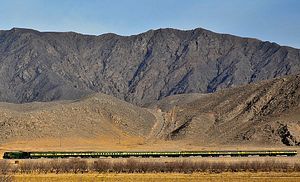In an unprecedented development, the U.S. Department of State has declared the Baloch Liberation Army (BLA) a militant organization under the country’s Foreign Terrorist Organization (FTO) listing. The BLA is a separatist group that primarily operates in Pakistan’s Balochistan province. According to the State Department’s listing, the “armed separatist group targets security forces and civilians, mainly in ethnic Baloch areas of Pakistan.”
A few months ago, Washington was threatening Islamabad with sanctions. What has changed concerning the U.S.-Pakistan bilateral relationship that the bilateral relationship is back on track?
Certainly, the move is the result of a number of steps taken in the bilateral realm between the two countries.
Given that cooperation and confrontation between the two remains on the issue of Afghanistan’s peace process, it’s possible that the nature of collaboration between the two countries has changed concerning the continuing Afghan issue. On the other hand, it’s also possible that Washington is offering Islamabad an olive branch to gain the latter’s cooperation to prepare for the impending withdrawal of its troops from Afghanistan.
Provided that both states have come to an agreement on the Afghan issue, the development related to the BLA’s listing as a terrorist organization shows Pakistan’s sensitivity towards the group’s activities in Baluchistan province. From Pakistan’s perspective, the listing of the BLA as a terrorist group means that the county has international legitimacy to go after the group domestically. Pakistan should be expected to ramp up its counter terrorism operations against the group in the country and elsewhere.
Clearly, Pakistan sees the issue of Baloch separatists finding support in Afghanistan and elsewhere an effort aimed at not only destabilizing Baluchistan but also an attempt to undermine the China Pakistan Economic Corridor (CPEC), a China funded development and infrastructure project in Pakistan.
Recently, a terrorist attack claimed by the BLA in Balochistan, resulted in the death of at least 14 security personals. Pakistan blamed the attack on Iran as the country believes that the group has established sanctuaries there. Following the attack, Pakistan’s foreign office criticized Iran for not doing enough to contain the group’s activity, which reflects that Islamabad takes the issue of cross border terrorism in Baluchistan very seriously.
Another recent attack in Gwadar has left a number of lessons for Pakistan concerning the threat of Baloch separatists. First, the fact that militants belonging to the BLA were able to breach a high level of security structure raises questions on the growing ability of militants. Second, the attack in Gwadar shows that there is a concerted effort on the part of the BLA to undermine China lead economic projects in Baluchistan. For Pakistan, this requires a concrete reaction which extends beyond Baluchistan’s borders.
Moreover, it’s interesting to note that some of the militants involved in the Gwadar attack were listed as missing persons. Their resurgence as militant’s underscores Pakistan’s position that BLA and other militants have not only established sanctuaries regionally but may also be collaborating with other militant groups. In Afghanistan, one group which stands to gain by working with the BLA is the Tehreek-e-Taliban Pakistan (TTP). TTP is a militant organization group which remains held up in Afghanistan after Pakistan’s recent counterterrorism efforts. Therefore, a potential collaboration between the TTP and BLA against Pakistan cannot be ignored.
Thus, it’s not a surprise that designating the group a militant group is one of the first thins which Pakistan has sought from the U.S. after the recent rapprochement with Washington. It’s likely that any potential peace agreement which the U.S. is going to sign with the Afghan Taliban and other regional stakeholders is expected to take up the issue of Baloch militant groups sanctuaries and support base in the region. Already, the RAND Corporation has prepared a potential peace agreement for Afghanistan which reportedly mentions an understanding on the issue of Baloch militants to assuage Pakistan’s security concerns.
Certainly, Washington’s listing of BLA as a terrorist organization is a major victory for Pakistan’s diplomacy and an indication of Islamabad’s improving relationship with Washington. The development will definitely help in bridging the existing trust deficit between the two countries.

































